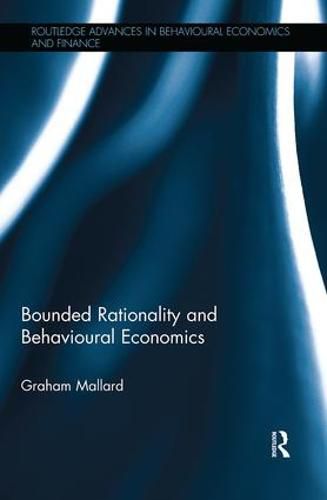Readings Newsletter
Become a Readings Member to make your shopping experience even easier.
Sign in or sign up for free!
You’re not far away from qualifying for FREE standard shipping within Australia
You’ve qualified for FREE standard shipping within Australia
The cart is loading…






Economics Nobel Laureate Herbert Simon developed the concept of bounded rationality in the 1950s. This asserts that the cognitive abilities of human decision-makers are not always sufficient to find optimal solutions to complex real-life problems, leading decision-makers to find satisfactory, sub-optimal outcomes. This was a foundational component of the development of Behavioural Economics but in recent years the two fields have diverged, each with its own literature, its own approach and its own proponents. Behavioural Economics explores the areas of commonality between Economics and Psychology, in terms of its focus and its approach, whereas the bounded rationality literature largely analyses the implications of sub-optimal decision-making through the mathematically sophisticated methodology of mainstream Economics.
This book examines the nature and consequences of this divergence and questions whether this is a case of beneficial specialisation or whether it is unhelpful, potentially stunting the development of some aspects of Economics. It has been suggested that the major deficiency of Behavioural Economics is that it has failed to produce a single, widely applicable alternative to constrained optimisation. This book evaluates the extent to which this is the true and, if it is, the extent to which it is a product of the divergence between the two literatures. It also seeks to identify commonalities between the two subjects and suggests avenues of research in Economics that would benefit from a re-fusion of these two fields.
$9.00 standard shipping within Australia
FREE standard shipping within Australia for orders over $100.00
Express & International shipping calculated at checkout
Economics Nobel Laureate Herbert Simon developed the concept of bounded rationality in the 1950s. This asserts that the cognitive abilities of human decision-makers are not always sufficient to find optimal solutions to complex real-life problems, leading decision-makers to find satisfactory, sub-optimal outcomes. This was a foundational component of the development of Behavioural Economics but in recent years the two fields have diverged, each with its own literature, its own approach and its own proponents. Behavioural Economics explores the areas of commonality between Economics and Psychology, in terms of its focus and its approach, whereas the bounded rationality literature largely analyses the implications of sub-optimal decision-making through the mathematically sophisticated methodology of mainstream Economics.
This book examines the nature and consequences of this divergence and questions whether this is a case of beneficial specialisation or whether it is unhelpful, potentially stunting the development of some aspects of Economics. It has been suggested that the major deficiency of Behavioural Economics is that it has failed to produce a single, widely applicable alternative to constrained optimisation. This book evaluates the extent to which this is the true and, if it is, the extent to which it is a product of the divergence between the two literatures. It also seeks to identify commonalities between the two subjects and suggests avenues of research in Economics that would benefit from a re-fusion of these two fields.